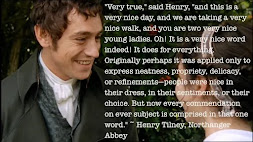 Jane Austen is very, very funny.
Jane Austen is very, very funny. She is whimsical, sardonic, ironic, dry, playful...all of it!
The 19th century language might disguise her caustic wit. For my Northanger Abbey rewrite, I updated various lines to give them modern impact, but they are--in fact--Austen's originally.
1. Literary Analysis.
Catherine attempts to talk about books with John Thorpe.
Even with Isabella, Catherine finds this enjoyable activity difficult. Isabella references Gothic novels as springboards to other conversations.With John Thorpe, an exchange of views about books is practically impossible. Thorpe claims he doesn't care for Gothic literature (and he gets authors confused)--except for The Monk, which was basically the nineteenth-century porn version of Twilight. Regarding Camilla, he states, "I assure you; it is the horridest nonsense you can imagine; there is nothing in the world in it but an old man’s playing at see-saw and learning Latin; upon my soul there is not."
The narrator then informs us that the "justness of this critique...was unfortunately lost on poor Catherine."
In my version, Thorpe gets a bunch of myths confused, prefers the more salacious ones, and then argues that all myths come about because gods get in a bother.
My narrator remarks wearily, "Make the man a literary critic."
2. Word choice.
Henry Tilney is a clever, self-conscious young man who likes to show off but not in a bombastic way.
He shows off around Catherine.
Although I changed the timing and the topics of Catherine's walk with the Tilneys, I retained Henry's joking criticism of Catherine's use of "nice" to describe a work (Udolpho)--though I have Catherine use the word "awesome."That is, Catherine and the Thebleys discuss myths. When Catherine describes them as "awesome," the following, in tribute to the original, ensues:
Henry said, “Do you mean awesome as in awe-inspiring or awesome as in generally appealing?”
Antione turned from where she walked a little ahead of Catherine and Henry.
“Ignore my brother,” she said to Catherine. “He has a bugbear about supposedly vague language. He teases me all the time about my word choices. Now he is doing it to you.”
Henry held up his hands, palms out. “I recently heard a horserace referred to as awesome; fireworks as awesome; a sunny day as awesome; lobster as awesome—”
Austen's passage does a fantastic job encapsulating Henry Tilney's personality.
3. Dealing with bullies.
In the original, John Thorpe is persuaded that he and Catherine are practically engaged based on an absent-minded remark. He isn't convinced of the engagement because he wants to be engaged--just, everybody is doing it! (And he thinks Catherine is an heiress.)
Catherine will not say that they are engaged, even when Isabella, her best best BEST friend, pressures her to say so.
Austen's version and mine are very close:
Austen: "You are describing what never happened."
Me: "Then he believes in something that never happened."
The beauty of Catherine's line is that she isn't being caustic or snide or mean or even coy. She isn't standing up to Isabella, yet her honesty undercuts Isabella's manipulations.
4. Compliments
While staying with the Tilneys, Catherine receives a letter from her brother, James. His engagement with Isabella is at an end. James writes that Isabella is engaged to Frederick Tilney, Henry and Eleanor's brother.
She isn't.
What sweet-natured people such as James and Catherine read as engagement, the rest of the world reads as flirtation (even in the nineteenth century). That is, no one supposes that Frederick and Isabella are engaged except James and Catherine.
Henry and Eleanor also know their brother. Frederick has zero desire to marry. And he doesn't.Catherine, however, is convinced by the letter. She believes that Isabella behaved badly in throwing over her brother. But at least she is in love "and though she has behaved so ill by our family, she may behave better by yours. Now she has really got the man she likes, she may be constant."
Catherine is nearly incapable of imagining that Isabella threw over her brother for little more than a flirtation, wishful thinking, castles-in-the-sky assumptions, and the lure of money/security. Catherine maintains that the engagement is real.
Henry responds, "Prepare for your sister-in-law, Eleanor, and such a sister-in-law as you must delight in! Open, candid, artless, guileless, with affections strong but simple, forming no pretensions, and knowing no disguise."
Henry is, of course, talking about Catherine, not Isabella. Catherine doesn't realize. Eleanor does.
Eleanor responds, “Such a sister-in-law, Henry, I should delight in.”
Too good a line to excise! I included it in Chapter 11.





No comments:
Post a Comment